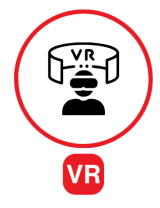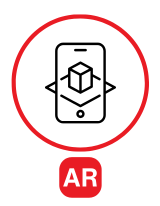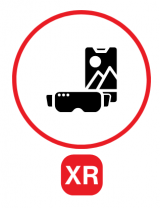- Getting Started
- What are Immersive Technologies?
- Benefits of Immersive Learning
- XR Learning at Carleton
- Additional Resources
- Teaching and Learning Services Support
Immersive technologies, including Extended Reality (XR), Virtual Reality (VR), and Augmented Reality (AR), are poised to have a transformational impact on teaching and learning at Carleton University. Teaching and Learning Services is ready to support your immersive learning projects through the Future Learning Lab and Experiential Learning Hub.
→Find out more about The Future Learning Lab
Carleton has also partnered with EON Reality to provide faculty and students with innovative virtual and augmented reality tools. VR Headset support is available for in course use with VR headsets and training. Instructors can use these technologies to create engaging and interactive immersive learning experiences for students.
→Find out more about EON Reality at Carleton
Getting Started
Immersive Technologies at Carleton are supported by Teaching and Learning Services. Check out the TLS Events page for upcoming workshops or book a one-on-one consultation.
What are Immersive Technologies?
Immersive technologies facilitate virtual experiences that imitate or enhance physical reality. There are multiple types of immersive technologies, including Virtual Reality (VR), Augmented Reality (AR), and Extended Reality (XR). These technologies allow you to view and interact with simulated 3D environments and objects using headsets or similar VR devices.
Virtual Reality

Virtual Reality (VR) is a simulated 3D environment that allows users to immerse themselves in an interactive virtual world that imitates reality. Using VR headsets, users can explore the virtual environment by moving around within a defined area.
Examples of VR include Virtual Internships, simulated trips to other countries, lab simulations and virtual art galleries.
Augmented Reality (AR)
 Augmented Reality (AR) is a technology that superposes digital elements into the user’s environment in real time, creating a hybrid reality that merges virtual and real-world elements. Unlike VR technologies that create immersive 3D simulations, AR alters a user’s perception by overlaying digital elements into their immediate physical surroundings. AR content includes animations, graphics, and 3D objects that can be viewed through headsets, smartphones, tablets, or smart glasses. The most common use of AR is text overlay.
Augmented Reality (AR) is a technology that superposes digital elements into the user’s environment in real time, creating a hybrid reality that merges virtual and real-world elements. Unlike VR technologies that create immersive 3D simulations, AR alters a user’s perception by overlaying digital elements into their immediate physical surroundings. AR content includes animations, graphics, and 3D objects that can be viewed through headsets, smartphones, tablets, or smart glasses. The most common use of AR is text overlay.
Examples of AR include text overlay, 3D models, and visualization of anatomy.

Extended Reality (XR)
Extended Reality (XR) is an umbrella term that encompasses any immersive technology that alters reality, including VR and AR.
Benefits of Immersive Learning
- Enhance Experiential Learning Skills and competency based learning.
- Create Immersive Experiences, Boost engagement and Create Realistic Simulations.
- Introduce material into the classroom in the form of scale models and recreations.
- Build spatial knowledge or increase procedural knowledge.
- Render Abstract concepts in new and more engaging formats.
XR Learning at Carleton
Teaching and Learning Services is ready to support your immersive learning projects through the Future Learning Lab and Experiential Learning Hub (coming Fall 2023). Carleton has also partnered with EON Reality to provide faculty and students with innovative virtual and augmented reality tools. Instructors can use these technologies to create engaging and interactive immersive learning experiences for students
Experiential Learning Hub
A new Experiential Learning Hub is coming to the 6th floor of Southam Hall. The Hub will feature three new spaces: a Teaching Studio, Creation Studio, and an Experience Studio. These studios will support experiential learning through XR media and enhance Carleton’s students’ skills in new media and digital literacies.
Resources for getting started in XR
Explore more resources for getting started with XR teaching concepts by visiting the MacOrdrum Library Virtual, Augmented, and Extended Reality (XR) Lib Guide.
EON Reality at Carleton
Carleton has received the Future Skills XR Grant from EON Reality, a world leader in augmented and virtual reality. This partnership will provide Carleton’s Future Learning Lab with access to the EON-XR platform, learning programs, licenses, and hardware. For more information on Eon-XR at Carleton, visit the EON-XR at Carleton support page.
Additional Resources
- Carleton Library Subject Guide on Teaching in XR
- XR Accessibility (UC Berkley)
- Designing XR for Accessibility and Inclusion
- Contact North: What’s Next for AR/VR and Immersive Learning?
Teaching and Learning Services Support
 Office Hours: Monday to Friday, 8:30-4:30
Office Hours: Monday to Friday, 8:30-4:30- Educational technology support: Visit the TLS Support Portal to enter a tech support request, or fill out the course consultation request form
- Course design or pedagogical support: Contact tls@carleton.ca